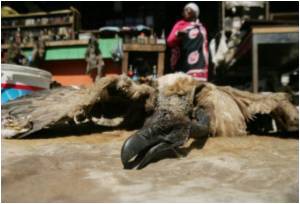
The white-backed vultures often shun national parks, preferring to forage further afield on private farms, said the first ever study on their range and habits.
"The vultures may actively avoid parks with numerous large mammal predators due to competition for food, and find easier pickings on cattle carcasses in farmland outside these protected areas," said Stephen Willis, from the School of Biological and Biomedical Sciences, Durham University, who co-authored the study.
African vultures prefer to feed in savannah grassland habitats and away from other competing carnivores, such as lions.
The white-backed vulture is a widespread but declining species in Africa and it is now listed as endangered, the journal Public Library of Science ONE reports.
Their behaviour and tendency to scavenge in groups means that vultures risk encountering dead cattle that have been administered veterinary drugs that are poisonous to them, or even poisoned carcasses intended to control other carnivores such as jackals, according to a Durham statement.
Advertisement
"We found that young vultures travel much further than we ever imagined to find food, sometimes moving more than 220 km a day. Individuals moved through up to five countries over a period of 200 days, emphasising the need for conservation collaboration," said Willis.
Advertisement
Source-IANS










